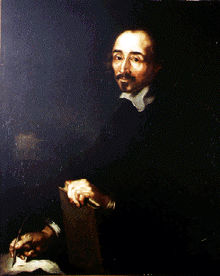Samuel Bochart
Samuel Bochart | |
|---|---|
 17th century portrait of Bochart | |
| Born | 10 May 1599 Rouen, Normandy, France |
| Died | 16 May 1667 (aged 68) Caen, Calvados, France |
| Nationality | French |
| Occupation | Reverend |
| Known for | French Protestant biblical scholar |
Samuel Bochart (30 May 1599 – 16 May 1667) was a French Protestant biblical scholar, a student of Thomas Erpenius and the teacher of Pierre Daniel Huet. His two-volume Geographia Sacra seu Phaleg et Canaan (Caen 1646) exerted a profound influence on seventeenth-century Biblical exegesis.
Bochart was one of the several generations of
Life
Bochart was born in
Bochart's Hierozoicon sive bipartitum opus de animalibus sacrae scripturae (2 vols., London 1663), a
In 1652
Bochart was a man of profound erudition; he possessed a thorough knowledge of the principal
His correspondence on theological subjects, carried on with
He died of apoplexy, aged 67, in the academy of Caen during an impassioned debate with Huet on the translation of a passage of Origen related to transubstantiation.
His major works
- a dictionary of Arabic
- Geographia Sacra seu Phaleg et Canaan (Caen 1646)
- De consiliandis in religionis negotio protestantibus, 1662
- Hierozoïcon, (London 1663)
Notes
- ^ Peter N. Miller, "The "Antiquarianization" of Biblical Scholarship and the London Polyglot Bible (1653–57)" Journal of the History of Ideas 62.3, (July 2001).
- ^ "Life of Animals". World Digital Library. Retrieved 27 February 2013.
- ^ "Absurd curiosity (for we must call things by their right names) has been carried so far as to seek Hebrew and Chaldee derivations from certain Teutonic and Celtic words. This, Bochart never fails to do. It is astonishing with what confidence these men of genius have proved that expressions used on the banks of the Tiber were borrowed from the patois of the savages of Biscay." Voltaire, Philosophical Dictionary, 1764: "Augury" (on-line Archived 9 September 2006 at the Wayback Machine)
References
- Miller, Peter N. "The "Antiquarianization" of Biblical Scholarship and the London Polyglot Bible (1653–57)" Journal of the History of Ideas 62.3(July 2001), pp. 463–482.
- Shalev, Zur. Sacred Words and Worlds: Geography, Religion, and Scholarship, 1550–1700, Leiden: Brill, 2012.
- ISBN 2-914266-04-9
- (Smitskamp, 2003) Samuel Bochart, Opera omnia Bibliographic description.
- This article incorporates text from a publication now in the public domain: Chisholm, Hugh, ed. (1911). "Bochart, Samuel". Encyclopædia Britannica (11th ed.). Cambridge University Press.
External links
- . The Nuttall Encyclopædia. 1907.
- Singer, Isidore; et al., eds. (1901–1906). "Bochart, Samuel". The Jewish Encyclopedia. New York: Funk & Wagnalls.
- Works by Samuel Bochart at Post-Reformation Digital Library
- Samuelis Bocharti Hierozoicon: sive De animalibus S. Scripturae, Volume 2 1794 Latin, at Google books
